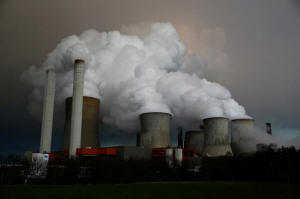|
Big role for U.S. at climate talks
despite withdrawal from Paris deal
 Send a link to a friend
Send a link to a friend
 [October 30, 2017]
By Alister Doyle and Nina Chestney [October 30, 2017]
By Alister Doyle and Nina Chestney
OSLO/LONDON (Reuters) - The United States
will play a big role at global talks next month on shaping the Paris
agreement on climate change, to the dismay of some nations that want
Washington sidelined because of President Donald Trump's plan to
withdraw from the deal.
U.S. officials have said they will be constructive at the annual
195-nation climate meeting in Bonn, Germany, from Nov. 6-17 to work on a
"rule book" for the 2015 Paris plan to shift the world economy from
fossil fuels this century.
But other nations are torn between welcoming or berating Washington's
envoys after Trump's decided in June to pull out and instead promote the
U.S. fossil fuel industry.
Washington retains its place in the talks because the Paris pact
stipulates that no country can formally pull out before November 2020.
"The Trump regime really needs to walk away and not hold the rest of the
world hostage to the President's ineptitude," said Ian Fry, who
represents Tuvalu, a low-lying Pacific island nation at risk of rising
sea levels and storm surges.

He told Reuters that Trump's pro-coal policies, and doubts that climate
change is caused by man-made greenhouse gas emissions, could undermine
urgency at the meeting of senior officials and environment ministers.
The White House did not respond to requests for comment and the State
Department has not set up a briefing ahead of the meeting, as it
traditionally has.
This year is on track to be the second warmest since records began in
the 19th century, behind 2016. Scientists say rising temperatures will
stoke ever more powerful hurricanes, floods and wildfires.
But U.S. delegates at preparatory meetings said they will play a
positive role in Bonn, said Nazhat Shameem Khan, chief negotiator of
Fiji which will preside at the meeting.
The U.S. approach "send positive signals ... that this will not be a
destructive COP," she said, using the shorthand for Conference of the
Parties. It is not yet clear if any U.S. political leaders will attend.
SYRIA, NICARAGUA
Many U.S. allies, including France, Canada and Britain, hope to coax
Trump to end up staying in the pact which is backed by all nations
except Syria. Nicaragua, which had judged the deal too weak, ratified it
this month.
In a sign that most nations are willing to permit a strong U.S. role, an
internal U.N. document obtained by Reuters shows that a U.S. official,
Andrew Rakestraw, will co-lead a section of the talks with a Chinese
counterpart on ensuring transparent rules for the Paris agreement.
And the U.S. delegation will be led by Thomas Shannon, a career diplomat
who gave a speech in 2015 calling climate change "one of the world's
greatest challenges".
[to top of second column] |

Steam rises from the cooling towers of the coal power plant of RWE,
one of Europe's biggest electricity and gas companies in
Niederaussem, north-west of Cologne, Germany March 3, 2016.
REUTERS/Wolfgang Rattay/File Photo

The meeting will work on a rule book, due to be completed in 2018,
for implementing the Paris agreement on issues such as the reporting
of greenhouse gas emissions and how national emissions will be
checked.
Washington and many other developed nations have long sought tough
rules to bind emerging nations such as China and India, which have
been wary of outside oversight.
And many delegates expect the U.S. officials, many of whom were
architects of the Paris accord under former President Barack Obama,
will contribute to clear, enforceable rules that will be in U.S.
interests whether it is in or out of the deal.
"Having the United States at the table with good negotiators who can
take this forward is a win-win," said Paula Caballero, a director of
the World Resources Institute think-tank and formerly a climate
negotiator for Colombia.
The treatment of the United States is likely to hinge on whether
Washington limits itself to technical details of the rule book or
promotes Trump's pro-coal political agenda.
"It is quite likely that the U.S. will be sidelined ... unless they
play a constructive role," said Elisa de Wit, head of climate change
at global law firm Norton Rose Fulbright.
Outside the conference center, a U.S. network called "We Are Still
In" will highlight actions by states, cities and other non-federal
groups to implement the Paris agreement and shift to wind, solar and
other clean energies.

It says Trump's pro-coal policies will be only a blip in a long-term
economic shift this century. "We need to make sure the world
maintains confidence in our ability to move forward," said
Washington State Governor Jay Inslee.
(Reporting by Valerie Volcovici in Washington; Alister Doyle in Oslo
and Nina Chestney in London; Editing by Matthew Mpoke Bigg)
[© 2017 Thomson Reuters. All rights
reserved.]
Copyright 2017 Reuters. All rights reserved. This material may not be published,
broadcast, rewritten or redistributed. |